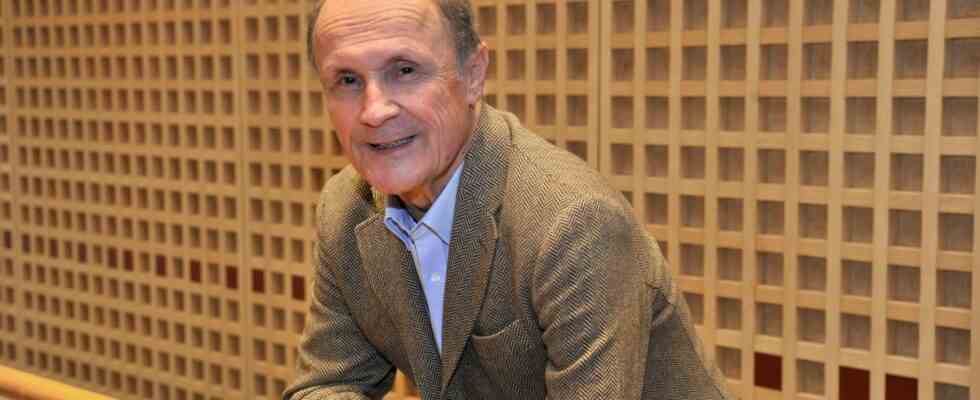Honorary posts have accompanied Reinhard Dirr for a long time. The former German teacher, SPD city councilor and cultural advisor is today, among other things, district chairman of the social association VdK, hospice helper and chairman of the senior citizens’ advisory board in Starnberg. In this function, he represents all over 60-year-olds in the city, which is a good quarter of the population. Poverty in old age, housing shortage, loneliness: many problems are coming to a head at the moment.
SZ: Mr. Dirr, in three sentences: What do senior citizens in Starnberg need?
Reinhard Dirr: You need the attention of the political representatives: mayor, city council and city administration. In addition, a strong representation of seniors, i.e. the seniors’ advisory board, is important. My third wish: that the citizens come to us as a senior citizens’ advisory board. You may need more courage to formulate your interests and problems.
As the Senior Citizens Advisory Board, you advise the city council and the city administration on all matters relating to senior citizens. What are your concrete demands on city politics in this regard?
We demand that they take senior policy more seriously and think for themselves. That goes to the political side and to the administration. However, this has improved considerably on our initiative recently.
In what way?
We got very energetic and said we needed innovations. The administration would have to give us all the documents that relate to senior citizens’ politics. The problem is that in administrative enforcement, individuals often do not primarily think of us seniors.
Which topics are you specifically concerned with?
One is mobility. Individual traffic, pedestrians, cyclists. Our stance is clear: we support all of the city’s plans to prioritize cyclists on the road, for example by building bike lanes. By the beginning of 2022, all bus stops should also be barrier-free. If you walk through Starnberg, this is the case for a few, the majority is still waiting for the renovation.
What else?
The second topic is living in old age. The population is getting older, the problems are becoming more urgent. I hope people become more demanding in the political arena and don’t rely on someone else to care. In particular, it is about multi-generational living: from young singles to families and seniors – everyone lives together in apartments. We have now requested this for the Wiesengrund.
The Rummelsberger Diakonie in Starnberg wants to improve the care they offer, and with the care base there has been a first central point of contact for caring relatives in the district since the beginning of the year. It’s not like nothing is being done.
These people all do a commendable job. However, the demand is significantly higher than the supply. The expansion fails mainly due to a lack of nursing staff. This problem is likely to get worse in the future. Counseling is also a huge problem. Only about 13 percent of those affected take advantage of one. The result: At the moment, 12 billion euros that are available for services are not being used.
When you think of the current crises: What are the most pressing problems facing Starnberg seniors in the next five years?
The financial situation at the moment. Many in Starnberg are doing well, but the majority are under pressure because of energy and rental costs. Living in Starnberg is considerably more expensive than anywhere else. Food prices are going up anyway. Helping these people will be the biggest problem in the next few years. That older people are not forced to move away or even slip into poverty. The situation in care will also worsen, especially now against the financial background. This also applies to home care.
How can each individual help in everyday life to make the lives of seniors easier?
A number of organizations take care of people who need help on a voluntary basis. We have to be thankful for that. That’s not enough. Those who do this work excellently can’t do that, but nothing. Each individual can also get involved: in the neighborhood help or with Caritas. In your own neighborhood you can ask: “How are you?” or “Need help?”. In the future it will be about inspiring people to volunteer and emphasizing the human benefit.
Do you also feel the dwindling interest in long-term voluntary work in the Starnberg Senior Advisory Board?
In the last election, only six seniors could be nominated, although there are seven places. There’s a gap. That depends on two things, first of all Corona: We were paralyzed for two and a half years. There were no public events. In the long term, the interest depends on how the senior citizens’ advisory board works: everything that we have an opinion on has to be conveyed to the public. Then the older people in Starnberg will also be interested in the Senior Citizens’ Advisory Board again.
And you yourself? How long do you intend to oversee the Senior Advisory Board?
I’ve been chairman since 2017. Even then I was thinking of a role as a normal senior citizens’ advisory board. I became chairman out of the blue. When this term ends, I’ll be 77. I may run again, but family comes first. The presidency must then pass into other hands. Otherwise I would be eliminated at the age of 81 (laughs).

